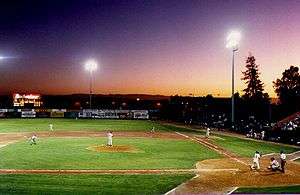San Jose Municipal Stadium
| Muni Stadium | |
 | |
| Location |
588 East Alma Avenue San Jose, CA 95112 |
|---|---|
| Coordinates | 37°19′14″N 121°51′44″W / 37.32056°N 121.86222°WCoordinates: 37°19′14″N 121°51′44″W / 37.32056°N 121.86222°W |
| Owner | City of San Jose |
| Operator | Baseball Acquisition Company |
| Capacity |
2,900 (1942) 4,200 (current) |
| Field size |
Left Field: 320feet Left-Center Power Alley: 365 feet Center Field: 390 feet Right-Center Power Alley: 365 feet Right Field: 320 feet Backstop: 50 feet |
| Surface | Baby Bermuda Grass |
| Construction | |
| Broke ground | April 1941 |
| Opened | March 8, 1942 |
| Construction cost |
US$80,000 ($1.16 million in 2016 dollars[1]) |
| Architect | Works Progress Administration |
| Tenants | |
|
San Jose Giants (CL) (1988–present) San Jose Bees (CL) (1983–1987) San Jose Expos (CL) (1982) San Jose Missions (CL) (1979–1981) San Jose Missions (PCL) (1977–1978) San Jose Bees (CL) (1962–1976) San Jose Pirates (CL) (1958) San Jose JoSox (CL) (1956–1957) San Jose Red Sox (CL) (1947–1955) San Jose Owls (CL) (1942) San Jose State Spartans (NCAA) (1970–present) | |
The San Jose Municipal Stadium, or Muni Stadium in common usage, is the home of the minor league baseball San Jose Giants, the Advanced A league affiliate of the San Francisco Giants located in San Jose, California. The Giants play in the northern division of the California League. The stadium is also home to the San Jose State University Spartans college baseball team for some regular season games (other regular season games are played across Alma Avenue at Blethen Field). The local high school baseball divisions also use Municipal Stadium as their championship field. The stadium also hosts concerts, weddings, dog shows, and many other local events. In the past Muni Stadium has been the home field for the San Jose Missions, the San Jose Bees, and the San Jose Expos.
History
San Jose Municipal Stadium was built in 1941–1942 as a WPA project at a cost of $80,000. It was one of the first stadiums to be built entirely of reinforced concrete and opened in 1942. The first game featured the San Francisco Seals as the home team.
Fans sit very close to the field in four distinct seating areas. The first 7 rows of the main grandstand are numbered box seats. General admission seating is available in the upper rows of the main grandstand on straight backed benches. Down the left and right field lines are several bleachers that are accessible for general admission use. And finally there is table seating down the third base line as part of the famous "Turkey Mike's BBQ Area". The stadium has remained largely unchanged from its original configuration. However, renovations to the bathroom facilities and clubhouse were done in 1994 and 3 extra rows of box seating were added in 1996.[2] In 1999, the dugouts were expanded toward the field.
Players sign autographs before and after every game as California League rules prohibit them from doing so during the game. The outfield walls are lined with advertisements much like the stadiums of the 1920s and 1930s were. Over the scoreboard in right field is a Diamond Vision video screen. The out of town scoreboard for other California League games are also hand hung. Fans are treated to all manner of games and entertainment between innings hosted by improvisation performers from ComedySportz San Jose. In-between inning activities include a tire toss, a child footrace around the bases and a fan favorite, "smash 4 cash", a competition where players attempt to smash the headlights of an old delivery truck to split $50 prize with a fan. Around July 4 every year, San Jose Municipal Stadium's fireworks show draws its largest attendance of the year, turning the foul line seating into standing room only.
In 1997, the bullpens moved from along the foul lines to the outfield. The visitor and home bullpens create artificial home run porches in left and right field respectively. In 2007, the outfield fence was replaced and moved in 10–20 feet in some areas and bullpens moved once again.[3]
Many major league players over the years have called San Jose Municipal Stadium home including, George Brett, Rod Beck, Joe Nathan, Chad Zerbe, Ron Hassey, Shawn Estes, Tim Lincecum and Buster Posey.
Municipal Stadium is located one block from Spartan Stadium, home to the SJSU football team. The area across Alma from Muni is also home to the San Jose State practice fields for soccer, baseball, and softball. Additionally part of Municipal Stadium's parking lot was converted into an indoor ice area named Sharks Ice at San Jose which is the practice venue for the San Jose Sharks NHL hockey team.
During the 2005–2006 offseason, a video board was added to the stadium along with a full-sized souvenir shed on the third base side of the stadium. The San Jose Giants introduced their first mascot, Gigante, during this offseason.[4]
See also
References
- ↑ Federal Reserve Bank of Minneapolis Community Development Project. "Consumer Price Index (estimate) 1800–". Federal Reserve Bank of Minneapolis. Retrieved October 21, 2016.
- ↑ "Changes at Municipal Stadium a Hit with S.J. Giants Fans". San Jose Mercury News. April 13, 1994.
- ↑ "Class A Upgrades". San Jose Mercury News. April 12, 2007. Retrieved May 31, 2014.
- ↑ "The Big Screen: San Jose Giants Add Video Board". San Jose Mercury News. April 6, 2006. Retrieved May 31, 2014.
External links
- San Jose Municipal Stadium – San Jose Arena Authority
- San Jose Municipal Stadium View – Ball Parks of the Minor Leagues
- San Jose Giants
- San Jose State Spartans